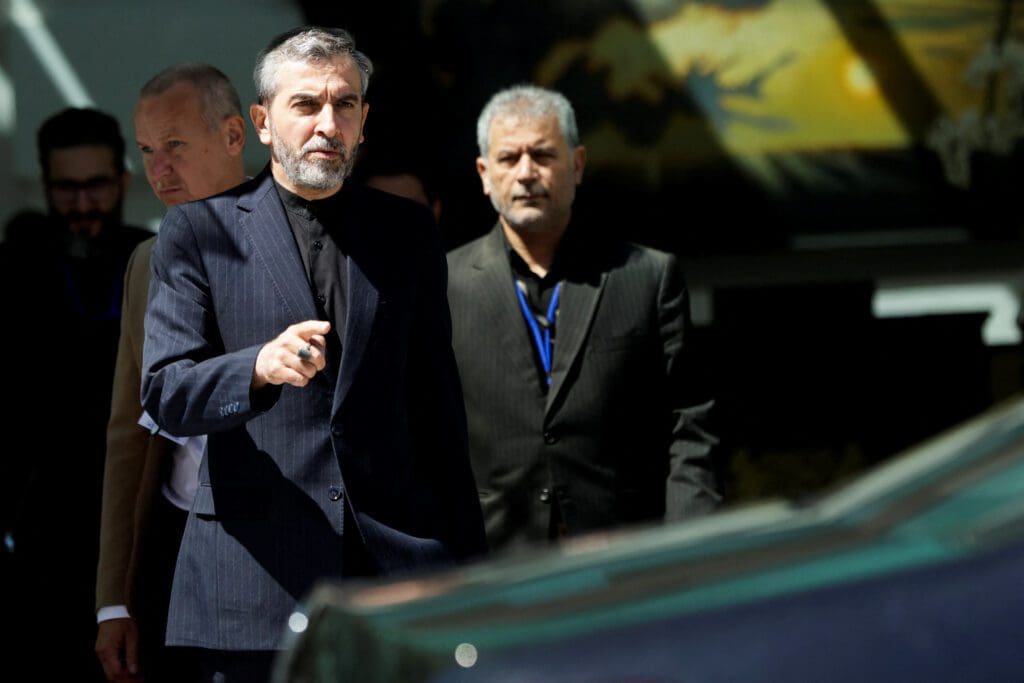Discreet talks between Iranian and Western officials have prompted rumors that they are nearing a new deal over Iran’s nuclear program, five years after the United States withdrew from the 2015 Joint Comprehensive Plan of Action (JCPOA). The original, landmark agreement had been a linchpin in global efforts to cap Iran’s nuclear development. But after then-U.S. president Donald Trump tore up the deal in 2018 and adopted its policy of “maximum pressure,” Iran gradually stopped complying and the agreement became largely meaningless.
In 2021, President Biden’s administration signaled its willingness to return to the JCPOA should Iran come back into compliance, but diplomatic efforts were largely fruitless and had been stalled since August 2022. Recently, however, a new track seems to have emerged: a push for an informal agreement, referred to by some Iranian officials as a “political ceasefire.”
Quiet negotiations, partly in Oman, have been exploring a potential pact along these lines. In exchange for freezing its uranium enrichment at its current level, ceasing attacks on American contractors in Syria and Iraq, expanding cooperation with international nuclear inspectors, and committing not to sell ballistic missiles to Russia, Iran expects the U.S. to refrain from tightening existing sanctions, seizing its oil tankers or pursuing new punitive resolutions against Iran at the United Nations or its nuclear agency.
This shift from a comprehensive deal like the JCPOA to a more limited and—as various reports suggest—informal “understanding” marks a significant change in the diplomatic landscape. “Serious and constructive” talks in June between Iran’s lead nuclear negotiator, Ali Bagheri-Kani, and the European Union’s deputy foreign policy chief, Enrique Mora, suggest that substantial diplomacy has resumed. If we are indeed witnessing a new phase of Iran-U.S. diplomacy, what is motivating Tehran and Washington, and what are the potential outcomes?
Iran: Avoiding War, Saving Face
The Islamic Republic views the current negotiations as an opportunity to have some of its assets unfrozen without necessarily rolling back its nuclear program. Under a prospective deal, Iran would cap its uranium enrichment at the existing level of 60% purity—far above the limit of 3.67% set in the JCPOA and closer to weapons-grade material, but still short of the near-90% needed for a bomb. Iran’s Supreme Leader Ayatollah Ali Khamenei has suggested that he would support such a deal provided Iran’s atomic infrastructure remains untouched.
In return, the U.S. could use sanctions waivers to unblock billions of dollars-worth of Iranian assets that are frozen overseas. But for Iran, more significant than the economic benefits is the possibility of desecuritizing the situation surrounding its nuclear program and avoiding an escalation with the U.S. and Israel. This is a central consideration given the looming leadership transition away from the 84-year old Khamenei. Preventing an external conflict is a paramount objective, as it could severely complicate and destabilize the transition process.
Another domestic consideration involves Iran’s factional politics. Hardliners, including President Ebrahim Raisi and his chief negotiator Bagheri-Kani, have long criticized the JCPOA, alleging that it yielded too much while gaining little in return. They argue that Raisi’s predecessor Hassan Rouhani and then-foreign minister Mohammad Javad Zarif should have negotiated a more advantageous deal. However, Raisi’s administration has since failed to secure a better agreement, meaning that the limited deal currently under discussion would offer them an opportunity to save face. They could claim they compelled the U.S. to accept Iran’s nuclear progress without significant compromises.
Yet critics in Iran, including moderates and reformists, are already criticizing Raisi over the talks. Some even draw parallels between the proposed terms of the new agreement and Iraq’s oil-for-food program under Saddam Hussein, noting that unfrozen assets would be strictly allocated for humanitarian use and would not directly benefit Iran’s economy.
American Interests:
For the Biden administration, this potential agreement carries significant strategic benefits. Firstly, it aims to prevent Iran from acquiring a nuclear weapon and extend the “breakout time” it would take for Iran to produce and mobilize weapons-grade nuclear material. The current talks have the potential to at least pause the rapid advancement of Iran’s nuclear program.
Another aim of reaching an agreement is to secure the release of American prisoners held in Iran. As Biden seeks re-election in 2024, achieving this goal and containing Iran’s nuclear program could provide a significant political win to bolster the administration’s foreign policy record.
Thirdly, the U.S. has an interest in mitigating the risk of military confrontations with Iran or its proxies, especially in Iraq and Syria, where Iran-backed militias have launched repeated and deadly attacks on U.S. forces and contractors. Even a limited agreement with Iran may work to curb violent confrontations.
Ideally, the U.S. would also address broader issues with Iran, including its ballistic missile program, its support for armed groups across the Middle East and its ties with Russia in the context of the ongoing war in Ukraine. Washington is also hoping that by easing tensions with Tehran, it can shift its focus to other strategic priorities, particularly countering the rise of China and intensifying great power competition more generally.
Implications and challenges
Although a potential agreement between the U.S. and Iran can be seen as a practical short-term solution, for Washington it would ultimately be a way to buy time until after next year’s presidential elections. The reported terms would be nothing close to a comprehensive solution to the deep issues between the two sides. Still, by dampening tensions, a limited deal aligns both with Biden’s Iran policy of “no deal, no crisis” and Khamenei’s stance of “no war, no negotiations”.
However, the limitations and uncertainties surrounding such a deal are evident. Critics point out that the rumored deal does not address key concerns over Iran’s nuclear program, such as breakout time, ongoing research and development activities, and its stockpile of highly enriched uranium. There is also no guarantee that either side will stick to its commitments or refrain from provocative actions that could jeopardize the agreement in the future. The reported deal also lacks a robust legal or institutional framework for monitoring compliance and resolving disputes.
Moreover, there has been little clarity over whether the other signatories to the JCPOA—China, Russia, France, the United Kingdom and Germany—would support or endorse such an agreement. Russia’s position will be crucial considering Moscow’s interest in Iranian support for its invasion of Ukraine and Russian fears that an agreement could free up more American resources to help Ukrainian forces fight back.
The reception from other states in the Middle East has been mixed. During the original JCPOA negotiations in 2015, regional actors, primarily Israel and Saudi Arabia, opposed the deal. Israeli Prime Minister Benjamin Netanyahu in June reiterated his long-held, staunch opposition to any agreement between the U.S. and Iran, but Saudi Arabia’s rapprochement with Iran following Chinese mediation indicates that Riyadh may no longer stand against it.
Another potential challenge could emerge from the U.S. Congress. On June 22, 33 senators introduced the “Iran Sanctions Relief Review Act,” demanding that Congress have legislative oversight of any agreement involving sanctions relief for Iran.
That said, the prospect of a “political ceasefire” between Iran and the U.S. is becoming increasingly plausible. Yet any such a deal would only be an interim solution. If an agreement is reached in the coming months, it will likely stop far short of providing a long-term, sustainable resolution to the deeply contentious issues between these nations.
The opinions expressed in this article are those of the author and do not necessarily reflect the views of the Middle East Council on Global Affairs.


